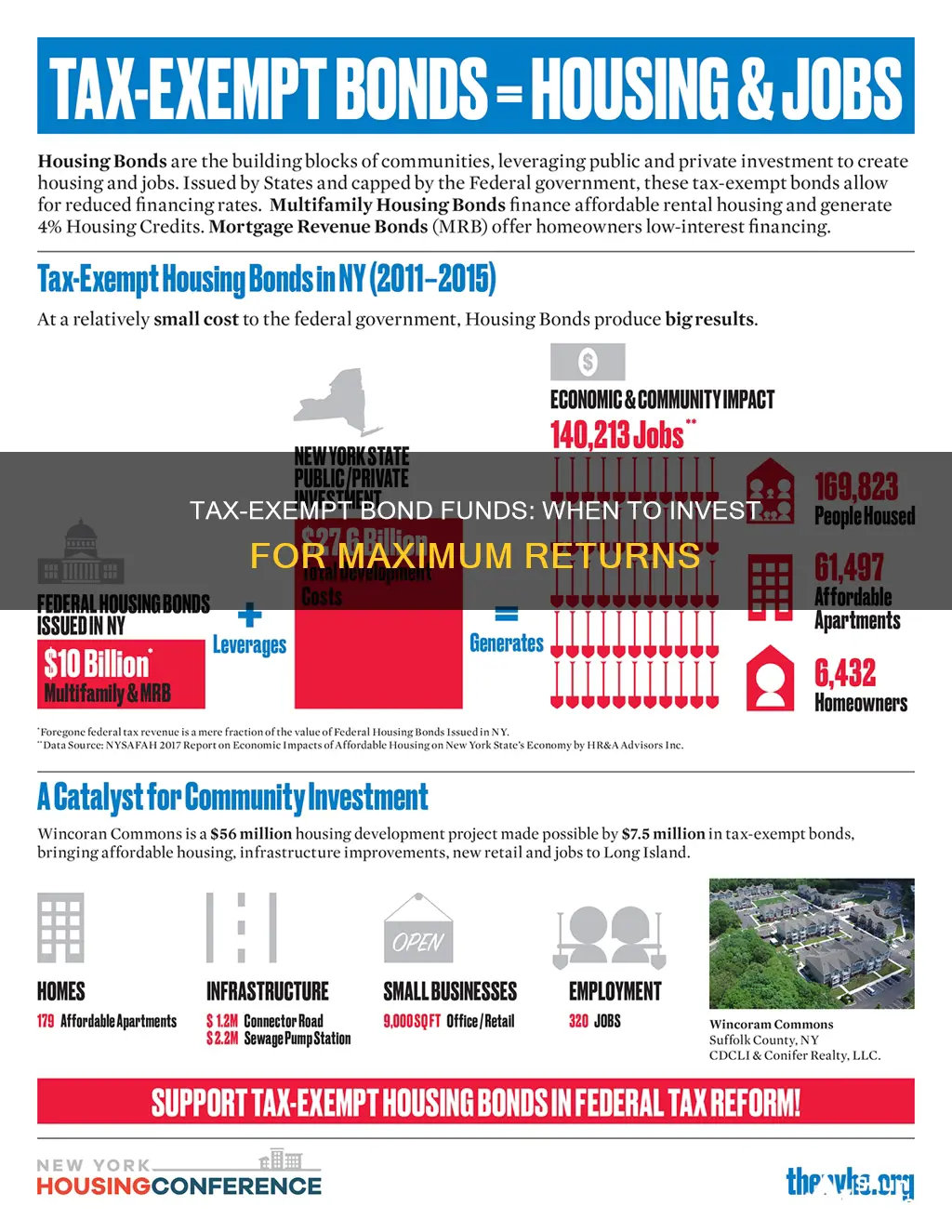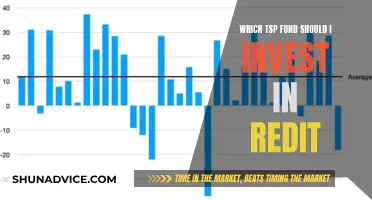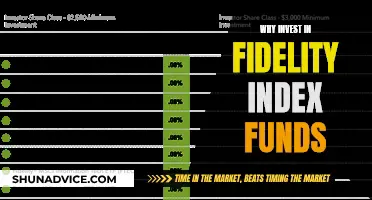
Tax-exempt funds are a great way to reduce your income taxes, but they are not for everyone. Municipal bonds, or munis, are exempt from federal taxes and are a relatively low-risk investment. They are issued by state and local governments to raise funds for public projects such as roads, bridges and schools. Municipal bonds are generally a high-quality asset class with a very low historical default rate. However, individuals interested in purchasing them need to consider several factors before making muni bonds part of their investment strategy. For example, the interest you receive from muni bonds is counted as income when calculating the taxable amount of your Social Security income, which could increase the amount you owe.
| Characteristics | Values |
|---|---|
| Tax treatment | Income from tax-exempt bond funds is generally not subject to federal taxes and may be tax-exempt at the state and local level as well, if the bonds are issued by the state in which you live. |
| Risk | Municipal bonds are considered low-risk investments with a very low historical default rate. |
| Suitability | Tax-exempt funds are not for everyone. They are most suitable for those investing outside of an IRA or another retirement plan and those in one of the higher tax brackets. |
| Interest rates | The interest rate paid on muni bonds is generally lower than rates for corporate bonds. |
| Diversification | Municipal bond funds provide diversification that can be difficult for investors to achieve on their own. |
| Management | Municipal bonds benefit from professional management, including monthly distributions and other structural advantages. |
What You'll Learn

Municipal bonds are exempt from federal taxes
Municipal bonds, or "munis", are exempt from federal taxes, but they are not always free from all taxes. They are also generally exempt from state income taxes if the issuer is from the investor's home state.
Municipal bonds are debt securities issued by state, city, county, or local governments to help cover spending needs and raise funds for public projects such as roads, bridges, and schools. They are often favoured by investors in high-income tax brackets because of the tax advantages.
While the interest income is usually tax-exempt for municipal bonds, capital gains realised from selling a bond are subject to federal and state taxes. The interest rate paid on muni bonds is generally lower than rates for corporate bonds.
If an investor buys the muni bonds of another state, their home state may tax interest income from the bond. It is beneficial to check the tax implications of each specific municipal bond before adding it to your portfolio, as you might be surprised by unexpected tax bills on any capital gains.
Choosing the Right Brokerage: Investment Funds Explained
You may want to see also

Tax-exempt funds can reduce income taxes
Municipal bonds, or "munis", are exempt from federal taxes and are a relatively low-risk investment. They are a type of government bond, and most have credit ratings that put them somewhere between U.S. Treasurys and investment-grade corporate bonds in terms of risk. Municipal bonds are generally a high-quality asset class with a very low historical default rate.
When deciding whether to invest in tax-exempt funds, ask yourself the following questions:
- Am I investing outside of an IRA or another retirement plan?
- Am I in one of the higher tax brackets?
If you answered "yes" to both of these questions, a tax-exempt fund might be worth considering.
Index Funds: Utopia or Dystopia for Investors?
You may want to see also

Tax-free municipal bonds are not always entirely tax-free
One of the taxes that may apply to municipal bonds is the de minimis tax. This tax applies to municipal bonds that are acquired at a market discount. The de minimis rule states that for bonds purchased at a discount of more than 0.25% for each full year from the time of purchase to maturity, gains resulting from the discount are taxed as ordinary income rather than capital gains. The ordinary income tax rate is generally higher than the capital gains tax rate, which could result in a larger portion of your yield being taxed.
Another tax to consider is the alternative minimum tax (AMT). The AMT is a parallel income tax system in the United States that disallows certain deductions that are allowed under the ordinary income tax code. Taxpayers must calculate their taxes under both systems and pay the higher amount. Income from some municipal bonds, such as those funding stadiums, airports, or business-like enterprises, may be subject to the AMT. If you are subject to the AMT and hold such a bond, your interest income will generally be taxed at the applicable AMT rate, which could be 26% or more.
Additionally, income from municipal bonds can increase the amount of your Social Security benefits that are taxable. The IRS includes income from municipal bonds in your modified adjusted gross income (MAGI) when determining the taxability of your Social Security benefits. If half of your Social Security benefit plus other income, including tax-exempt municipal bond interest, exceeds certain thresholds, up to 85% of your Social Security benefits may be taxable.
Municipal bond interest can also affect the amount you pay for Medicare Part B or Medicare prescription drug coverage. If your MAGI, which includes municipal bond interest, exceeds certain thresholds, you will be required to pay an additional amount for these Medicare coverages.
Finally, if you sell a municipal bond for a price greater than your cost basis, you may be subject to capital gains tax.
In summary, while municipal bonds offer significant tax advantages, they are not always entirely tax-free. It is important to understand the potential tax implications before investing in these securities.
Fixed Income Funds: Where Are Your Investments Going?
You may want to see also

Municipal bonds are relatively low-risk investments
Municipal bonds are generally considered safe investments compared to almost any other type of investment, especially stocks. They are also known as "munis" and are debt securities issued by state and local governments. These can be thought of as loans that investors make to local governments, which are then used to fund public works such as parks, libraries, bridges, and roads, as well as other infrastructure.
The interest paid on municipal bonds is often tax-free, but there may be state or local taxes in some cases. The interest rate paid on muni bonds is generally lower than rates for corporate bonds. However, the fact that interest income is often tax-free can result in yields that are comparable to, or even higher than, corporate bonds.
The default rate on municipal bonds is very low. Between 1970 and 2022, the cumulative 10-year default rate averaged just 0.15%, and this includes both higher- and lower-rated municipal bonds. In 2022, there was only a single municipal bond default out of the vast number of bonds outstanding.
Municipal bonds are generally a high-quality asset class with a very low historical default rate. They offer investors a low-risk investment with fixed income and can be a good option to diversify a bond portfolio.
What's the Return on Investment for Founders?
You may want to see also

Tax-exempt funds are not for everyone
Your Tax Bracket
If you are in a higher tax bracket, tax-exempt funds can be advantageous as you can save on taxes and reduce your tax bill. However, if you are in a lower tax bracket, the lower yields associated with tax-exempt funds may not offset the taxes you would pay, resulting in a lower overall return.
Type of Account
Tax-exempt funds are most beneficial when held in a taxable account. If you are investing within a tax-advantaged account like an IRA or 401(k), you won't gain any additional tax benefits from tax-exempt funds. In this case, you may be better off with other investment options that offer potentially higher yields.
Social Security Considerations
If you receive Social Security benefits, be aware that the interest from tax-exempt municipal bonds can be counted as income when calculating the taxable amount of your Social Security income. This could result in an increase in the amount of taxes you owe.
State and Local Taxes
While municipal bonds are typically exempt from federal taxes, they may still be subject to state and local taxes, depending on the state in which you live and where the bonds are issued. It's important to understand the tax implications at the state and local levels before investing.
Interest Rate Risk
Like any bond investment, tax-exempt bond funds carry interest rate risk. If you invest in long-term bonds and interest rates rise during that period, you may be stuck with a poor-performing investment, and the value of your bonds will likely decline. Shorter-term bonds may be a better option in a rising interest rate environment.
Inflation Risk
Investing solely in low-yielding tax-exempt bonds may not provide returns that outpace inflation. Over time, this could result in a loss of purchasing power, as your money may be worth less in the future. Consider balancing your portfolio with other investments, such as stocks, to offset this risk.
The Mindset of Investment Fund Managers: Traits and Insights
You may want to see also
Frequently asked questions
Tax-exempt funds are a smart way to reduce your income taxes, but they are not for everyone. They usually produce lower yields, but you generally don't have to pay federal taxes on earnings from tax-exempt money market and bond funds.
Tax-exempt funds are a good fit for those investing outside of an IRA or another retirement plan and those in one of the higher tax brackets.
Municipal bonds, or "munis", are exempt from federal taxes and are relatively low-risk investments. They are debt instruments issued by states, cities, counties, and other governmental entities to raise funds for public projects such as roads, bridges, and schools.
Municipal bonds are generally exempt from federal taxes and, in many cases, state and local taxes as well, especially if the bonds are issued by your state of residence. They are also considered a high-quality asset class with a very low historical default rate.
You can buy and sell municipal bonds directly through an online brokerage account, or through a full-service brokerage or bank. Another option is to invest in an exchange-traded fund (ETF) or mutual fund that invests in municipal bonds.







